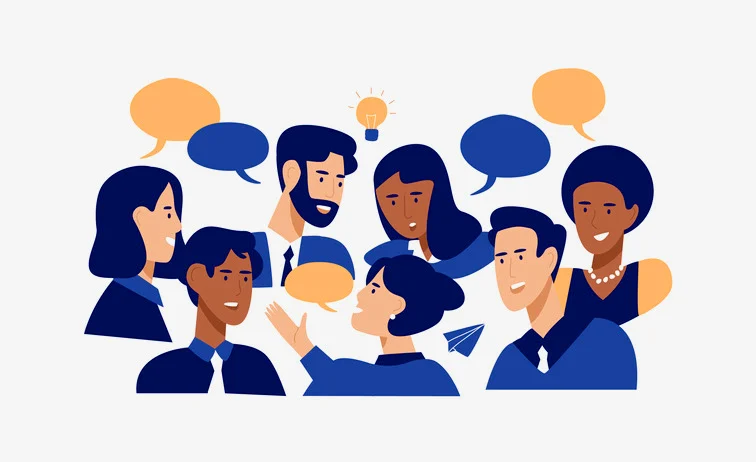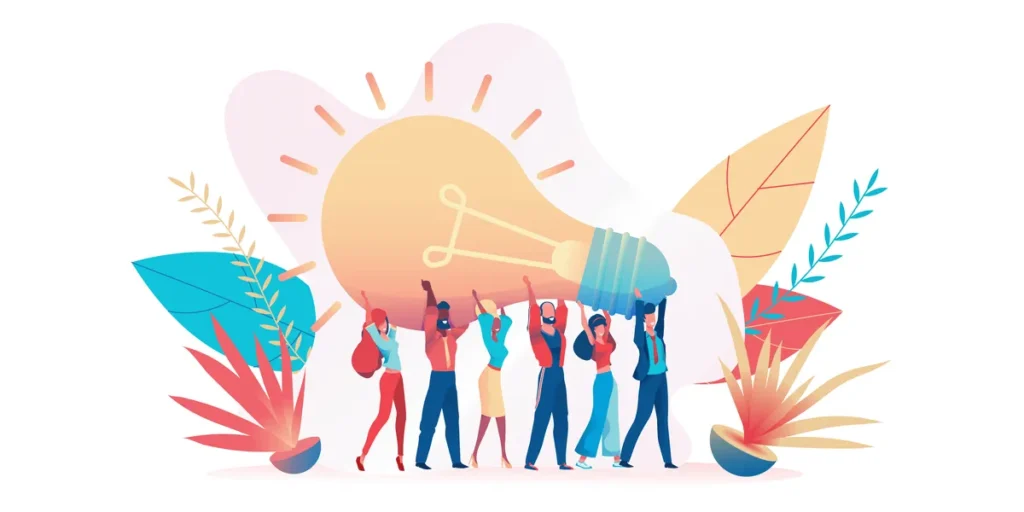Creating a successful team involves more than just gathering skilled individuals. In this article, discover essential strategies like defining roles, fostering communication, and promoting collaboration to ensure your team’s success.
Key Takeaways
- Building a successful team requires defining clear goals, establishing roles and responsibilities, and fostering open communication to promote collaboration and trust.
- Understanding the key stages of team development, as outlined in the Tuckman model, is essential for guiding teams through challenges and achieving effective teamwork.
- Recognizing achievements and promoting a culture of accountability and continuous learning are critical for enhancing team morale, motivation, and overall effectiveness.
Defining a Successful Team

A successful team is more than just a group of individuals working together; it is a cohesive unit focused on achieving goals and supporting business success. High-performing teams can achieve productivity and profitability that far exceed those of average teams, making them invaluable assets to any organization. Successful teams have key ingredients that make a team succeed truly successful.
Key qualities and elements necessary for building strong teams and successful teamwork include important aspects such as:
- Collaboration, team bonding, diversity, and leadership
- Effective communication, clear expectations, trust, and respect
- Fostering an environment where team members feel valued and supported, which promotes collaboration, improves efficiency, and encourages the sharing of diverse perspectives
Diversity within teams is an important component that contributes to successful teamwork. Leveraging individual strengths and encouraging diverse ideas helps teams achieve high levels of innovation and problem-solving. Strategies for achieving team success include:
- Defining clear goals
- Establishing roles and responsibilities
- Fostering open communication
- Building trust and collaboration
- Celebrating successes.
Key Stages of Team Development
Understanding the key stages of team development is crucial for guiding a team towards success. The Tuckman model, developed by Bruce W. Tuckman in the mid-1960s, outlines four stages of team development:
- Forming
- Storming
- Norming
- Performing.
In the Forming stage, team members typically feel excited but may also experience anxiety about fitting into the group. During the Storming stage, team members often confront frustrations regarding different aspects of team processes and goals. This stage is characterized by conflicts and disagreements, which, if managed well, can lead to growth and understanding.
The Norming stage is characterized by improved communication and a commitment to resolving conflicts among team members to solve problems, adhering to the ground rules. As the team moves into the Performing stage, team members experience a strong sense of accomplishment and teamwork, focusing on achieving goals effectively.
Team development is not a linear process; teams can revert to earlier stages due to new members, climate changes, or milestones. Recognizing a team’s development stage can help improve effectiveness and facilitate goal achievement.
Essential Team Dynamics for Success

For a team to be truly successful, certain dynamics must be in place:
- A strong culture of psychological safety allows team members to take interpersonal risks without fear of judgment.
- Creating a safe environment for sharing ideas encourages participation from all team members.
- This leads to diverse approaches and better decision-making.
Dependability is another crucial dynamic. Dependable teams ensure that members consistently deliver quality work on schedule, which is essential for effective teamwork. Structure and clarity help define roles and expectations, providing team members with a clear understanding of their job expectations and processes.
The five key dynamics of effective teams include:
- Dependability
- Structure & Clarity
- Meaning
- Impact
Recognizing the impact of one’s contributions fosters a sense of purpose within the team. An important factor in finding personal growth and significance in work boosts overall team effectiveness.
Trust and collaboration among team members lets team members enhance creativity and foster a sense of belonging. An adaptable team that prioritizes employee satisfaction creates a supportive environment that values contributions and ideas, promoting team work for the entire team.
Establish Clear Roles and Responsibilities

Clear roles and responsibilities are the backbone of any effective team. When each team member understands their own roles, they can contribute strategically to the team’s goals and work autonomously. Defining clear roles allows team members to prioritize their tasks effectively and understand the overall plan for achieving objectives.
Assigning roles based on individual strengths enhances collaboration among team members and reduces the likelihood of conflicts to avoid confusion. Regular role clarification exercises foster understanding among team members regarding each other’s contributions. When team members are aware of each other’s roles, it promotes interdependence and enhances overall teamwork.
Foster Open Communication

Open communication is the lifeblood of a successful team. It builds a trusting and efficient work environment where employees feel comfortable sharing their ideas. Establishing an open communication culture can significantly enhance employee engagement and satisfaction. Clear communication fosters a culture of respect and openness within a team.
Effective communication leads to improved teamwork and collaboration by fostering trust among team members. A strategy for promoting open dialogue includes encouraging feedback and creating safe spaces for discussion. Leaders should model open communication by being transparent and approachable, which encourages the same from team members.
Utilizing technology tools can facilitate ongoing communication and ensure that all team members stay informed. Key strategies to enhance communication within the team include:
- Developing a feedback system that includes positive feedback and praise to foster open dialogue among team members.
- Holding regular meetings.
- Encouraging honest feedback to help enhance communication skills within the team.
Promote Collaboration and Team Spirit

Building trust among team members is crucial for fostering an accountable and cooperative team dynamic. Acknowledging achievements fosters a culture that prioritizes trust and appreciation, enhancing team cohesion. A strong sense of team spirit significantly boosts morale and productivity among team members.
Regular team-building activities help to forge meaningful connections between team members. Key strategies to enhance team atmosphere and morale include:
- Empowerment and shared responsibilities contribute to a unified team atmosphere.
- Regular celebrations of both small and significant milestones can significantly enhance employee engagement and morale.
- Incorporating fun elements into recognition events can help break workplace monotony and build camaraderie among team members.
Encouraging participation and valuing each member’s input fosters a collaborative environment. By promoting collaboration and team spirit, organizations can create a supportive and productive team culture.
Encourage Creativity and Innovation

Encouraging creativity helps generate unique ideas and alternative methods that lead to better outcomes and solutions. Involving team members in regular idea-sharing sessions can cultivate a culture of creativity and encourage innovative ideas thinking. When team members collaborate across different departments, it can lead to innovative breakthroughs that address complex challenges.
A culture that encourages creativity and innovation can inspire creativity in team members to think outside the box and develop new ideas and creative solutions to challenges.
Leadership and Accountability

Accountability within a team encourages each member to take responsibility for their contributions. A culture where accountability is prioritized creates an environment of responsibility among team members. An absence of accountability can lead to organizational misalignment and a lack of ownership within the team.
A results-oriented approach aligns team efforts towards common organizational goals and fosters a culture of achievement. Effective team leaders communicate their goals clearly to ensure team alignment and focus. Creating transparent goals for team leader promotes accountability and allows teams to see their progress.
Employee training and development demonstrate that the organization values its staff and fosters opportunities for personal and career growth. A well-structured training program can lead to increased employee engagement, as it provides a clear path for individual growth. Companies that support their employees’ learning and development are seen as more attractive employers, especially among job seekers looking for growth.
Provide Support and Resources

Providing support, training, and resources is essential for enhancing team skills and ensuring job satisfaction. Teamwork helps teammates learn new concepts and new skills, promoting overall team progress. If appraisals reveal skill sets gaps, it is critical to provide proper training and support to team members.
An adaptable management approach allows for optimal resource allocation by adjusting resources to meet changing demands. Continuous learning and improvement are essential for teams to stay adaptable and innovative.
Recognize Achievements and Celebrate Milestones

Recognizing achievements boosts motivation and productivity within the team. Team members can foster a culture of appreciation by encouraging each other to share their successes and celebrate milestones. Rewarding top contributors with company merchandise such as hoodies or jackets effectively motivates them.
By recognizing achievements and celebrating milestones, organizations can create a positive and motivating work environment where team members feel valued and appreciated, achieving success.
Adapt and Customize Management Practices

Emotional intelligence is a key skill for managers in adapting to team needs. Curiosity and flexibility among team members enhance a team’s adaptability. Teams can prepare for unforeseen challenges by planning to adapt strategies ahead of time and being transparent about revisions.
Adaptability benefits team members by providing support through learning new aspects of the job when someone is unable to complete tasks. By customizing management practices to fit the unique needs of their teams, managers can foster a supportive and adaptable team culture.
Evaluate Progress and Offer Constructive Feedback

Regular evaluation of team and individual performance is vital to maintaining a competent team. Performance reviews can help identify issues related to productivity or communication. Constructive feedback is intended to guide individuals towards achieving better outcomes rather than simply criticizing.
Timely feedback enhances the ability to make impactful changes before issues escalate. Specific examples should accompany feedback to illustrate points clearly and avoid ambiguity. Addressing the impact of an employee’s actions helps them understand the broader implications of their behavior.
Actionable steps should be provided alongside feedback to help individuals know how to improve.
Conclusion
Summarize key points from the blog post. Reinforce the importance of collaboration, communication, trust, and leadership in building a successful team. End with an inspirational phrase that motivates the reader to implement the strategies discussed.
Frequently Asked Questions
What are the key characteristics of a successful team?
A successful team is defined by effective communication, clear expectations, trust, respect, collaboration, and the inclusion of diverse perspectives. These elements are essential for fostering an environment where teamwork can thrive.
What are the stages of team development?
The stages of team development are Forming, Storming, Norming, and Performing. Understanding these stages is crucial for fostering effective team dynamics.
How can open communication be fostered within a team?
Open communication within a team can be effectively fostered by encouraging feedback, establishing safe spaces for discussion, and leveraging technology tools to promote continuous dialogue. This approach ensures that team members feel valued and heard.
Why is recognizing achievements important for team success?
Recognizing achievements is crucial for team success as it boosts motivation and productivity, while fostering a culture of appreciation and enhancing employee engagement and morale. This recognition ultimately contributes to a more effective and collaborative team dynamic.
How can managers adapt their practices to fit the needs of their teams?
To effectively meet the needs of their teams, managers should cultivate emotional intelligence, embrace curiosity and flexibility, plan for unexpected challenges, and maintain transparency in their decision-making. This approach fosters a supportive and adaptive team environment.

A trailblazer in humanising leadership and building high-resilience teams. As a former United Nations Peacekeeper, he leverages his high-stakes experience to redefine leadership dynamics. With a career distinguished by numerous accolades, Joseph now helps organizations thrive through a human-centric approach, enhancing performance, productivity, and workplace culture.







